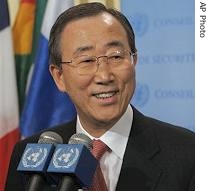-
(单词翻译:双击或拖选)
By Peter Heinlein
United Nations
02 January 2007
Ban Ki-moon, in his first day on the job as U.N. secretary-general, has named Darfur, North Korea and the Middle East among his top priorities. From U.N. headquarters, VOA's Peter Heinlein reports Mr. Ban avoided criticizing the execution of Saddam Hussein.
 |
| New UN Secretary-General Ban Ki-moon gives a news conference at UN headquarters, 2 Jan 2007 |
Mr. Ban was greeted with applause from U.N. staff Tuesday as he took over as the world body's eighth secretary-general.
His first order of business was to pay respects to U.N. peacekeepers and others who died in the line of duty. He paused for a moment of silence at a meditation1 room in the U.N. lobby.
Before going into a closed meeting with employees, the new U.N. chief spoke2 of the difficult challenges he faces in the world's trouble spots.
"I start my duties at a daunting3 time in international affairs, starting from Darfur to Middle East to Lebanon, Iran Iraq, North Korea, many other crises that trouble our world," he said.
Mr. Ban is viewed as closer to the United States than his predecessor4, Kofi Annan, who often clashed with Washington on policy issues. But in his introductory statement, the new secretary-general had a carefully phrased word of caution to those who would exercise power unilaterally.
"These challenges and issues need to be addressed collectively, with collective wisdom and collective efforts." he added. "Not a single person, including secretary-general of the United Nations, not a single country, however strong, powerful, resourceful may be, cannot address this. We need to have some common efforts."
When asked about the execution of former Iraqi leader Saddam Hussein, Mr. Ban chose his words carefully. He backed away from previous U.N. criticisms of capital punishment.
"Saddam Hussein was responsible for committing heinous5 crimes and unspeakable atrocities6 against the Iraqi people, and we should never forget the victims of his crimes," he said. "The issue of capital punishment is for each and every member state to decide."
Mr. Ban told reporters he is already working on the crisis in Sudan's Darfur region. He says he will meet his special envoy7 to the region, Jan Eliasson, Wednesday, and plans to travel to Africa later this month, where he hopes to meet with Sudan's President Omar al-Bashir.
"I'm going to meet with special envoy of secretary-general Jan Eliasson tomorrow morning. I intend to attend African Union summit meeting later part of this month," he explained. "There I hope I will be able to consult with the president of Sudan and other leaders of Africa."
The former South Korean foreign minister says the North Korean nuclear issue will remain a priority on his agenda. He said he plans to push for continuation of the six-party talks involving the two Koreas, along with the United States, Russia, China and Japan.
Mr. Ban is expected to begin naming key members of his administration later this week. He has already named award-winning Haitian broadcast journalist Michele Montas as his spokesman, and Vijay Nambiar of India as his chief of staff. Nambiar previously8 served as a special adviser9 to former Secretary-General Kofi Annan.
 收听单词发音
收听单词发音
1
meditation

|
|
| n.熟虑,(尤指宗教的)默想,沉思,(pl.)冥想录 | |
参考例句: |
|
|
|
2
spoke

|
|
| n.(车轮的)辐条;轮辐;破坏某人的计划;阻挠某人的行动 v.讲,谈(speak的过去式);说;演说;从某种观点来说 | |
参考例句: |
|
|
|
3
daunting

|
|
| adj.使人畏缩的 | |
参考例句: |
|
|
|
4
predecessor

|
|
| n.前辈,前任 | |
参考例句: |
|
|
|
5
heinous

|
|
| adj.可憎的,十恶不赦的 | |
参考例句: |
|
|
|
6
atrocities

|
|
| n.邪恶,暴行( atrocity的名词复数 );滔天大罪 | |
参考例句: |
|
|
|
7
envoy

|
|
| n.使节,使者,代表,公使 | |
参考例句: |
|
|
|
8
previously

|
|
| adv.以前,先前(地) | |
参考例句: |
|
|
|
9
adviser

|
|
| n.劝告者,顾问 | |
参考例句: |
|
|
|















